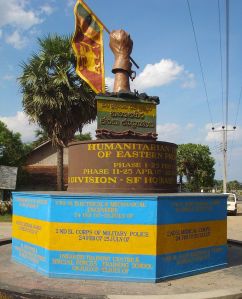Still emerging from a brutal 26-year civil war that ended in May 2009, Sri Lanka’s economy has experienced unprecedented growth and stability.
The protracted conflict subjected the population to extreme social and economic inequalities, as well as bouts of violence and human rights violations. This resulted in huge loss of life and an extremely underdeveloped economy and state infrastructure. The pre- and post-election violence in 2010 exemplifies the initial instability within the Sri Lankan government following the end of the war. The state has since undergone a phase of consolidation with less in-house disputes reported. However, this stability could be attributed to an amended constitution which further enhances presidential power and autonomy within the government.
The business of restructuring an economy following the long awaited cessation of an intra-state conflict is a complex and multi-faceted task. Developing both short and long-term political objectives is imperative to sustaining and maintaining peace whilst simultaneously reviving the economy. Ensuring economic freedoms and equal access to basic services is essential. These objectives must be addressed quickly and effectively, avoiding the institutionalisation of unjust economic inequalities that could induce peace spoilers.
In the context of the many dangers and pitfalls facing a post-conflict state, Sri Lanka’s recent economic growth is certainly commendable. The Fitch Ratings, published on 30 April 2013, recognised the Sri Lankan economy as strong, with a continual improvement of the current account deficit. GDP grew by 8.2% in 2011 and 6.4% in 2012; current projections are of around 7% growth in 2013 and 2014. Its success is also marked by the decision in July 2012 not to extend the IMF’s stand-by funding programme.
Following the end of the conflict, the government has focused on expanding the Sri Lankan economy by investing in both state infrastructure and the private sector, particularly in manufacturing and services. Enhancing investment together with the liberalization of these sectors has served to incite growth and increase disposable income. Public confidence in the government continues to increase as it makes political decisions with tangible economic results for the population. For instance, the streamlining of business start-ups demonstrates governmental recognition of the need for economic freedoms and empowering the population following decades of mistrust.
Victory monument which was set up after the Sri Lankan government military forces’ victory over LTTE in the Eastern theatre. Reconciliation in government is still needed.
Despite economic and political development, the state is not without risk. There still exists a need for political reconciliation between the two major ethnic groups, particularly as the Sri Lankan government has not yet internationally acknowledged the war crimes committed throughout the violent conflict. Widespread reports of press censorship also highlight a lack of transparency and accountability. Successful reconciliation in a post-conflict state necessitates a foundation of truth. Without an acknowledgment of the past, Sri Lanka faces the possibility of future insurgency.
Furthermore, the judicial system is widely recognized as unworkable due to its incompetency in handling caseloads and unreasonable court fees, which are unaffordable to most. It is vital that the Sri Lankan government addresses these issues; failing to generate public trust in political and judicial systems could lead to a relapse in societal appeasement and significant political risks. A system of Community Mediation Boards is currently alleviating this concern in the judicial system. However, this can not be considered a long-term solution as it is based upon a network of volunteers and thus could easily collapse.
The unexpected spike in electricity prices last week, the possible consequences of which should not be underestimated, is also a concern. According to the Asian Development Bank, there has been progress in the energy sector, evidenced by an increase of 65% in the national electrification ratio over a twelve-year period. However, the sector is still plagued by inadequate technological development and high running costs. Intermittent access to basic amenities could lead to a lack of confidence in the Sri Lankan government which coupled with other social grievances within a fragile society may lead to public dissent, particularly among Tamils. Thus, imminent modernisation to the energy sector is vital to enhancing the legitimacy of the Sri Lankan state, and thereby ensuring stability moving forward.
In addition to the plethora of domestic challenges facing Sri Lanka, the economy faced a number of external setbacks in 2012 slowing the pace of economic growth. The downturn in the global economy has limited Sri Lanka’s exports, mostly due to the recession faced by its primary trading party, the European Union. Additionally, the drought prevalent during most of 2012 severely affected agricultural production – one of the economy’s most important sectors and source of employment. The IMF has acknowledged the drought as the main influence behind the decline in real GDP growth to 6.4% in 2012.
To maintain economic growth, the Sri Lankan government must continue to work toward controlling inflation and improving the deficit. The government must also improve the administrative infrastructure it currently has in place: its low tax revenue is partly due to inadequate public administration. Strengthening this infrastructure will ultimately aid in administering future economic projects.
Even with the backdrop of unfavourable external conditions, there is a real atmosphere of optimism and Sri Lanka’s economy continues to strengthen. The government still faces difficulties ahead. A foundation of transparency is required to consolidate the state’s stability, and it is essential that Colombo continues to innovate socioeconomic policies which directly affect the people, particularly the Tamil population. Moreover, it is important for the state to seek new opportunities for innovation and trade so as to continue boosting its macroeconomic performance. Considering Sri Lanka’s remarkable progress so far, continued economic growth together with gradually increasing public support demonstrates stability and a promising future for the recovering state.











